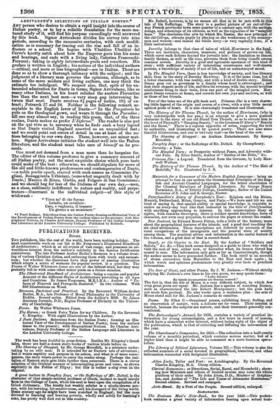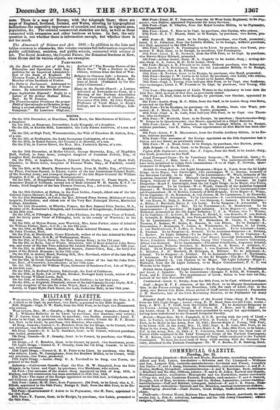PUBLICATIONS RECEIVED.
Boons.
THE publishers, like the rest of the world, have been making holiday. The most considerable work on our list is Mr. Fergusson's Illustrated Handbook of Architecture ; which is at all events of vast range, and possesses an ad- ventitious interest from the author's celebrity in the famous fortification Controversy. The late Professor Archer Butler's Sermons is a volume treat- ing of various Christian duties, and enforcing them with truth and earnest- ness,- but whether the discourses have that power of passing illustration which adapts a series of sermons for popular review, is a question. The Poems of Walter Whitmore Jones are not of the loftiest kind, but they may probably fall in with some other minor poets on a future occasion.
The Illustrated Handbook of Architecture: being a concise and popular Account of the different Styles of Architecture prevailing in all Ages and Countries, By James Fergusson, M.R.I.B.A.; Author of " Pa- laces of Nineveh and Persepolis Restored." Li two volumes. With 860 Illustrations on Wood.
Sermons, Doctrinal and Practical. By the Reverend William Archer Butler, M.A., late Professor of Moral Philosophy in the University of Dublin. Second series. Edited from the Author's MSS. By James Amiraux Jeremie, D.D., Regius Professor of Divinity in the Univer- sity of Cambridge.
Poems. By Walter Whitmore Jones.
The Heroes; or Greek Fairy Tales for my Children. By the Reverend C. Kingsley. With eight Illustrations by the Author.
Foal Italiani. Selections from the Italian Poets; forming an His- torical View of the Development of Italian Poetry, from the earliest times to the present; with Biographical Notices. By Charles Arri- vabene, Deputy Professor of the Italian Language and Literature in the London University College.
The week has been fruitful in prose fiction. Besides Mr. Kingsley's Greek tales, there are half-a-dozen story-books of various kinds before us. The Shaving of Shagpat, by Mr. George Meredith, is a mistaken under- taking by an able man. It is intended for an Eastern tale of adventure ; lmtit wants rapidity and purpose in its action, and what is of more conse- quence, the story wants power to carry the-reader along. Perhaps the imi- tation of Eastern style gets little further than externals. There is a clever adoption of the Oriental manner of intermingling prose and verse, as shown • Ily in the Fables of Pilpay; but this is rather a clog even in the A great feature in Naughty Boys, or' the Suferings of MI'. Delteil, is the character of that simple-minded professor of Greek, doomed to teach unruly bops in the College of Leon, while hissoul is bent upon the compilation of a- Greek dictionary. The kindly but weakly scholar ii a nicely-drawn per- son, with his learning, his sensitiveness, and his disregard of the living world. Shine century ago. he might have been matched in England; but the man devoted to learning- and braving poverty, wholly and solely for learning's sake, has pretty well died out in this country. Mr. Delteil, however, is by no means all that is to be met with iir thia tale of his Sufferings. The story is a perfect picture of an out-oMhe- wxy French provincial town some quarter of a century ago, with the sayings, doings, and schemings of its citizens, as well as the rogueries of its "naughty boys." The charlatan-like arts by which Mr. Tessin the new principal of the old College, attracts pupils by playing on the weaknesses of his country- men and women—and indeed the whole story—is very capitally done, ill a little caricatured.
Dorothy belongs to that class of tales of which Heartsease is the head. There sire incidents, characters, manners, and pictures of grown-up life, which carry such fictions beyond the juvenile tale : the limitation to almost family themes, as well as the tone, prevents them from being class& among common novels. Dorothy is a good and agreeable specimen of this kind of story ; with sufficient variety of interesting occurrences and well-drawn persons, a knowledge of society if not of life, and an unhackneyed moral.
In The _Mingled Yarn, there is less knowledge of society, and less literary skill, than in the story of Dorothy Mowbray. It is of the same class, but of a lower character, with less reality, and with a kind of double story Helen Deans goes out as governess to a family whose head is extravagant ; and first their elegant mode of life, and then its reverses, with the mental troubles misfortunes bring in their train, form one part of the mingled yarn. Mar- garet Deana remains at home, and records her own joys and sorrows, as well as those of her friends.
Two of the tales are of the gift-book sort. Princess The is a very charm- ing little legend of the origin and course of a river, with a nice little moral against pride of heart. It is also charmingly translated and illustrated.
The History of Sir Thomas Thumb, by the author of Heartsease, (who is very indefatigable with her pen,) is an attempt to give a more poetical character to the story of our old friend Tom Thumb, so as to elevate him to the level of Perrault's "Sleeping Beauty," or the Countess D'Alnoy's "Beauty and the Beast." There is a copious appendix of notes, supporting the text by authority, and illustrating it by quoted poetry. There are also some fanciful illustrations, and one or two very real—as the head of the cow. The Shaving of Shagpat : an Arabian Entertainment. By George Meredith.
.Naughty Boys; or the Sufferings of Mr. Deitch. By Champfieury. _Dorothy: a Tale.
The Mingled Yarn ; or Prosperity without Peace, and Adversity with- out Pain. By Eliza Smith, Author of "Battles of the Bible," &c. Princess use: a Legend. Translated from the German, by Lady Max-
well
The _History of Sir Thomas Thumb. By the Author of "The Heir of Redcliffe," &c. Illustrated by J. B.
Materials for a Grammar of the Modern English Language : being an attempt to fuse in one system the Grammatical Principles of the Eng- lish and Ancient Classical Languages, for the better elucidation of the Classical Structure of English Literature. By George Henry Parminter, B.A., of Trinity College, Cambridge ; Rector of the United Rectories of S. John and S. George, Exeter.
Paterfamilias's Diary of Everybody's Tour: Belgium and the Rhine, Munich, Switzerland, Milan, Geneva, and Paris.—We have said till we are tired of saying it, that special ability or special knowledge is requisite to endow an every-day tour like that indicated in the title of Paterfamilias with anything approaching to interest. In this commonplace diary of sights, with remarks thereupon, there is neither special knowledge, force of character, nor even racy prejudice, to enliven the pages or attract the reader.
New Zealand, by Edward Brown Fitton, tells a little of the history, more about the geographical features of the islands, and a good deal touching the six chief settlements. These descriptions are followed by accounts of the rural occupations of the immigrants and the general state of society among them. The practical advice and information is the useful feature of the volume, and a good deal of that is second-hand.
Sayah, or the Courier to the East. By the Author of "Soldiers and Sailors," &e. &c.—This book seems designed as a guide to those who wish to visit the seat of war, either now, or hereafter when its brazen throat has ceased to roar. The information only gets as far as Constantinople, though the author seems to have proceeded further. The book itself is an account of steam excursions from Marseilles to the East and back again ; in which words and opinions predominate very greatly over facts or practical information.
The Seer of Sinai, and other Poems. By J. W. Jackson.—Without strictly applying Mr. Jackson's own lines to his own poem, we may quote them : "Lofty themes By hands incompetent are beauty marred." The fact is, that the life of Moses is a very difficult subject, to which few even great poets are equal. Mr. Jackson has a species of sounding fluency, such as characterized the late Robert Montgomery; but the gods have not made him poetical. He also works upon a mistaken plan : the acts of Moses stand still for Mr. Jackson's remarks de omnibus.
Poems. By Ellen a—Occasional poems, exhibiting fancy, feeling, and an observation of nature, with a delicate ear for verse. Their interest is limited, because the subjects are narrow, and their treatment generally con- ventional.
The Entomologist's Annual, for 1856, contains a variety of practical in- formation for young entomologists, and a few tours in search of insects, which have a somewhat wider interest, without losing sight of the object of the publication, which is that of collecting and diffusing the information of the year.
The Churchman's Companion, for 1855.—The collection into a half-yearly volume of a monthly periodical, which contains serious matter, but of a higher kind than it might be able to command as a mere business specu- lation.
The Library of Biblical Literature, Volume III—This volume is also the collected numbers of a serial devoted to geographical, historical, and other information connected with Scriptural illustration.
Alton Locke, Tailor and Poet: an Autobiography. By the Reverend Charles Kingsley, M.A. Cheap edition.
Clerical Economics; or Directions, Social, Rural, and Household ; show- ing how Ministers and others of limited income may raise the whole platform of their order. By John Aiton, D.D., Minister of Dolphin- ton, and Author of "The Life and Times of Alexander Henderson." Second edition. Revised and enlarged.
Anti-Maud. By a.Poet of the People. Second' edition, enlarget
ALMANACIES;
The Business Man'e Note-Book, for the year 1856.—This pocket- book contains a great variety of information bearing upon actual busi- ness. There is a map of Europe' with the telegraph lines; there are maps of England, Scotland, Ireland, and Wales, showing by typographical indications the respective importance of counties and states, as regards area, population, &e. The colonial commercial statistics are full, as well as those connected with companies and other business at home. In fact, the only question is, not whether there is information enough, but whether there is not too much.
The Almanack of Science and Art. I856.-In addition to the lists and tables common to almanacks, this volume contains full information respecting public exhibitions, societies, and public schools, connected with science or art. The Royal Academy, the Crystal Palace, the Botanical Gardens at Hew, Gore House and its various objects, are examples.
Eastinuarra.
an the Bank Charter Act of 1844, its Author of "The Russian Shores of the
Principles and Operation ; with Sug- Black Sea." With a Preface to this gestions for an Improved Administm- edition, written from the Seat of War.
tion of the Bank of England. By Religion in Common Life: a Sermon. By Thomas Tooke, F./1.8., Corresponding the Reverend John Caird, M.A.Bin.Member of the Institute of France. ister of Errol. (Published by her Ma- The Paths to Parliament. Addressed to jesty's Command.)
the Members- of the House of Com-
mons. By Administrative Reformer. Husk in the Parish-Church : a Lecture
delivered at Newcastle-on-Trne, at a
Peace Sophistries Exposed ! Reply to a
Letter of Sir Arthur Hallam Elton, Bart. By W. Dundee.
The 21-anscaucasian Provinces the proper Efeld of Operationfor a Christian Army: being a second edition of" The Coming Campaign." By Laurence Oliphant,
Meeting of the Durham Association for the Promotion of Church Music, November 27th 1855. By John Hullah, Professor of Vocal Music in King's
College, and in Queen's College, Lon- don.



























 Previous page
Previous page